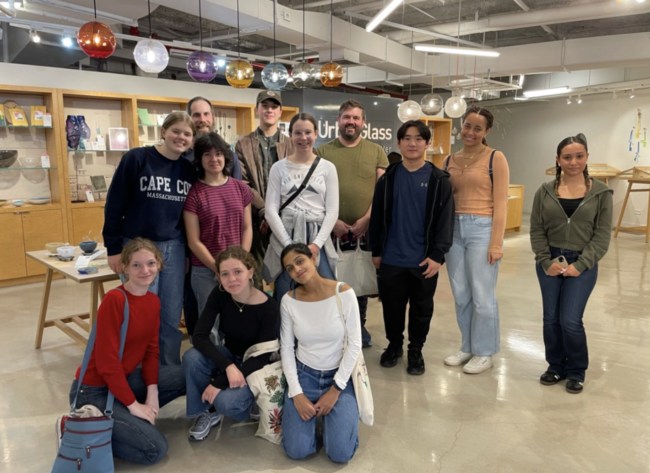Editors’ Note: Unless otherwise specified, all image sources are Lily Saal.
Sweat ran down my face in rivulets. The reheating chamber, donned the “glory hole,” by the instructors, blasted 2000 degrees into my face and gave my entire body what felt like one whopping sunburn. In my hands, I held a long pole with sticky glass at the end. This was glassblowing, an experience like no other.
On Tuesday, April 9, a small group of Fieldston students, led by Matthew Fischer and Scott Wulfson, took advantage of the second day of the Alternative Learning Period (ALPs) to learn how to blow glass. All students navigated the tortuous MTA subway system successfully and ended up at Urban Glass, a space for glass artists and students, in Brooklyn. Wearing the required uniform – jeans and long-sleeved cotton – the group grabbed lab-safety glasses. I encouraged the group to grab orange ones, noting, “We need to bleed Orange!”
Our tour guide Karina gave us a quick introduction and split the group in half: one half headed to the glassblowing studio and the other to a tour of the facility. My group headed to the studio and met our four instructors, each receiving three students to work with.
Originally from Colorado, our instructor Alli went to college upstate and never understood the city kids’ homesickness. When she moved to Brooklyn 12 years ago, however, she understood. She’s loved living in NYC ever since. She started glassblowing in college; it was her “underwater weaving class,” meaning the one random college class students always seem to take and fall in love with. Alli treated us to her Dora the Explorer impersonations and kept us safely laughing throughout the glassblowing process.
Amelia Citron (Form V) and Liv Kunzer (Form III) joined my group under Alli, who wasted no time; she quickly ran through the different parts of the operation: the tools, the reheating chamber (which looks like a furnace) and our workspace. The goal of the day? Make a cup.
Those close to me know my artistic skills are lacking. Nevertheless, I have always loved hands-on art activities, especially one that involves a bit of danger. Determinedly, I worked to make my cup the best Brooklyn has ever seen. Alli and I set to work, while Citron and Kunzer, waiting for their turns, eagerly cheered me on.
Crafting a Cup:
We inserted a pole into the reheating chamber (Glory hole!) and added glass on the tip. (When hot, glass acts like honey – super sticky!)
Next, we cooled down the pole in water so we could touch it – see the smoke, love the smoke!
Based on our color choice, we dipped the end of the pole with hot sticky glass, into colored metals
We started to shape the glass with a wooden spoon, which needed to be wet so that it didn’t catch on fire.
We BLEW, where the name glassblowing comes from, into the bottom of the pole – creating an air bubble within the glass.
To make the bottom of the cup, we used a paddle to flatten the glass.
Using the tool “Jacks,” also referred to as “Stabby, Stabby, Psycho Killer,” we created an opening – the top of the cup.
After dripping some water on the tip of the pole, which separated the glass and the pole, we flipped the pole over and smacked it hard, resulting in the glass detaching from the pole.
Citron’s favorite step: blowtorching the bottom of the glass so it’s even. (With two hands)
Finally, we put our finished products in an annealer, essentially a kiln, where the glass cooled for 12-16 hours.
In addition to the glassblowing workshops, Urban Glass treated us to a tour of their facilities where college students and professional artists work.
In the Flame Shop, we met Maria, an expert bead maker, who uses a torch that runs on gas and oxygen.
Also in the Flame Shop: Gigi, who showed us her intricate way of creating chain links out of glass. Gigi joked, “Been doing this for seven years, and I’m still learning!”
In the Cold Shop, artists put the finishing touches on their glass pieces by sanding, grinding and cutting.
In the Mold Shop, artists create molds out of plaster and silica. They cover their molds in glass and put them in kilns, and their designs come out just like their molds!
Tashi, an artist in the Mold Shop, showed us his wax mold.
Our tour ended at Urban Glass’ store. 60 percent of the art sold is from the artists working in studios upstairs.
After all the groups finished their tours and glassblowing, one group member joked, “This is the real artist experience: feet sore and everyone sweaty.” Regardless of fatigue, the group felt proud. We weren’t the best artists there, but we certainly had some of the most fun.
For some students, the experience was a long-anticipated bucket list item. “This was something I’ve wanted to do since I was a kid,” said Madison Macaluso (Form III). “It met all my expectations.” For others, glassblowing was spontaneously new. For example, I learned about glassblowing for the first time on the ALP sheet. I signed up on a whim and spent the day learning about something I had never experienced, and probably never would have. That’s what ALP days are: getting out of your comfort zone, doing some Dora impersonations and blowing some glass.






